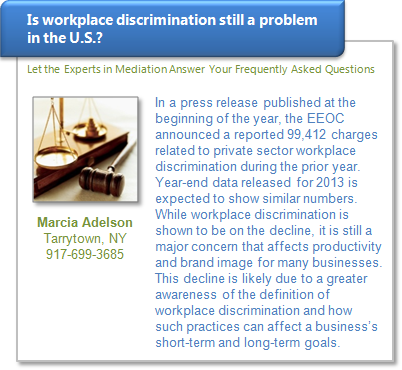 Many interpersonal issues in the workplace can be effectively resolved through the use of mediation. This process can help resolve problems involving harassment in the workplace, discrimination, retaliation, hard feelings over a lost promotion, problems between coworkers and problems with a supervisor, among others. Mediation is an important process and alternative to litigation, so it is important that the parties properly prepare for it.
Many interpersonal issues in the workplace can be effectively resolved through the use of mediation. This process can help resolve problems involving harassment in the workplace, discrimination, retaliation, hard feelings over a lost promotion, problems between coworkers and problems with a supervisor, among others. Mediation is an important process and alternative to litigation, so it is important that the parties properly prepare for it.
A case can be mediated at any point in the process. Early mediation can be effective in the workplace setting so that the parties can maintain the employment relationship. Additionally, if there is clear liability, the case can be resolved quickly to avoid publicity or embarrassment associated with an ugly lawsuit.
One of the first forms of preparation that must be completed is a mediation brief. This is a document prepared by each party’s legal representatives that describes the facts involved in the case and forwards legal arguments. The briefs should be well researched and contain recent court decisions that held in favor of their represented side. The attorneys send these briefs to the mediator before mediation begins. The attorneys generally provide the other side with a copy of the brief.
The parties can help to actively prepare for mediation. They can provide copies of communication, contracts or other written evidence that establishes their version of events and legal arguments. They may have pictures, video or other forms of evidence that can be persuasive. It is important that attorneys have all relevant evidence before they mediate so that they can negotiate from a position of strength. Mediation may be the last day of the legal dispute, so it is important that the parties and attorneys are properly prepared.






